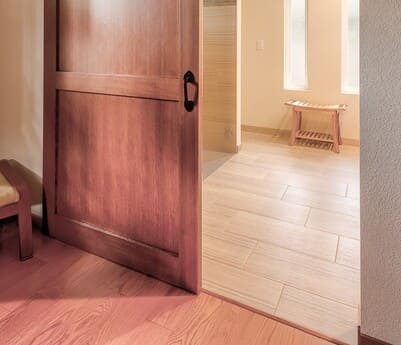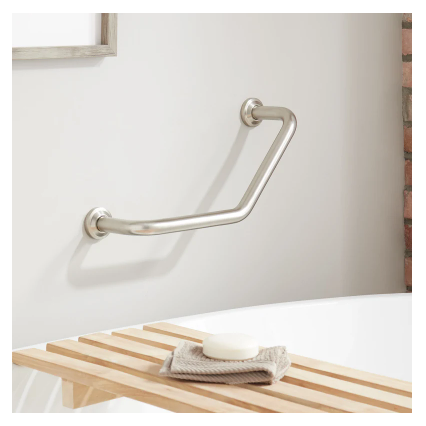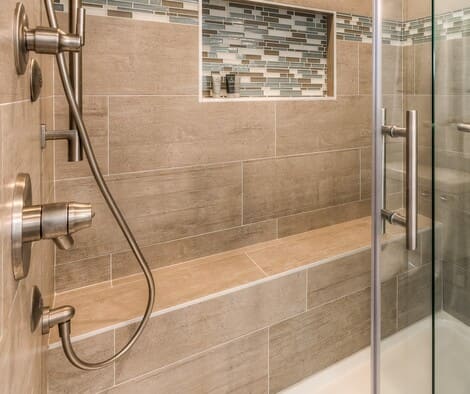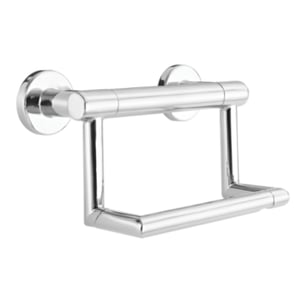According to USC's Leonard Davis School of Gerontology, "90% of adults over 65 want to remain in their current homes as they grow older." Unfortunately, visual impairment, mobility disabilities and other issues related to getting older can make aging in place much harder. According to this resource from Harvard's Joint Center for Housing Studies, more than a third of US seniors under 80 live with a disability. The report notes that "41 percent of older adults aged 65-79 have at least one self-care, household activity, or mobility disability." For seniors over the age of 80, "this share rises to nearly 71 percent." Of the disabilities that affect our elderly population, the most common is "household activity disability." These disabilities can make it difficult for seniors to engage in routine self-care and move safely around their homes. In short, seniors can struggle to age in place even when the overwhelming majority of elderly Americans hopes to do so. Remodeling spaces to better suit aging homeowners can make an enormous difference. Aging in place bathroom design is especially significant, as many injuries amongst elderly homeowners occur in this space. In this post, our team of Snohomish County bathroom remodelers lists seven aging in place bathroom design ideas. From elderly bathing solutions like installing a curbless shower to universal design ideas like widening doorways, follow below to learn more.
FAQs About Senior Friendly Bathroom Designs
What is Universal Design?
Universal design is an approach to interior design and architecture that aims to make homes and public spaces accessible for all people. Regardless of age, height, health or ability, universal design ensures each space is easy and enjoyable to use for every member of the household.
With Washington State seniors in mind, universal design is at the heart of our work at Vanderbeken Remodel. Our own Ron and Jennifer VanderBeken are CAPS-certified -- a special designation from the NAHB. This means that they are both Certified Aging-in-Place Specialists -- uniquely qualified to help seniors stay in their homes well into their golden years.
How Can I Make My Bathroom More Senior-Friendly?
There are dozens of ways to make a bathroom more senior-friendly. Some are more complex than others -- requiring the assistance and expertise of a design-build remodeling firm. Others are relatively inexpensive and fairly simple to install yourself.
By widening doorways, raising toilet seats and replacing slippery tile with more appropriate flooring, you can make your bathroom more senior-friendly. Keep reading to learn more or check out our other post about aging-in-place home remodeling.
What is the Average Cost of an Aging in Place Bathroom Remodel?
The cost of a bathroom remodel varies based on where you live, what you hope to achieve and which modifications you choose. The size of your bathroom, the age of its plumbing and the condition of its electrical will affect the cost too. Availability of labor and materials in your specific area can also change the total cost. Premium fixtures and specialty items could increase your expenditure as well.
Aging in place remodeling can be more expensive because additional updates might be required. For example, one might need to replace the toilet with a taller version or install a walk-in-shower.
Thankfully, there are many cost-effective ways to make your bathroom more senior-friendly. Installing grab bars, adding benches to the shower and layering light fixtures can all make a major difference. For more information about how much you might spend on Washington bathroom remodeling, check out our home remodeling cost guide.
Seven Aging in Place Bathroom Design Ideas
 #1 Install a Curbless Walk-In Shower
#1 Install a Curbless Walk-In Shower
First on our list of aging in place bathroom design ideas is to install a curbless walk-in shower. Installing a walk-in shower eliminates the need for seniors to lift their legs over walls of a tub or curb of a shower. This can prevent falls that occur when seniors must keep their balance while trying to enter the shower or tub.
#2 Add Grab Bars Wherever Needed
Next, on our list of elderly bathing solutions is to add grab bars wherever needed. Common places to install grab bars include near the toilet, outside the shower and opposite a shower bench. Costing as little as $50 for a no-frills version and as much as $500 for designer styles, grab bars can be accessible and stylish.
 An elbowed grab bar like the one featured here is perfect for seniors who need help standing up from a bench. For help choosing the right grab bar for your space, reach out to your local Snohomish County bathroom remodelers.
An elbowed grab bar like the one featured here is perfect for seniors who need help standing up from a bench. For help choosing the right grab bar for your space, reach out to your local Snohomish County bathroom remodelers.
#3 Opt for a Walker and Wheelchair-Accessible Vanity
According to Judith Graham in an article for KHN, around "2 million older adults in the U.S. use wheelchairs." Referencing Census Bureau data, Graham notes that "another 7 million use canes, crutches or walkers." Unfortunately, not all bathrooms allow seniors who use a wheelchair or walker to easily access their vanity.
We recommend opting for a floating vanity with enough space below to accommodate a wheelchair. There are plenty of wheelchair-accessible vanities with storage compartments. As such, one need not sacrifice style or storage in the name of universal design.
#4 Move the Primary Suite to the First Floor
Our fourth Washington bathroom remodeling tip for seniors is to move the primary suite to the first floor. Relocating your primary suite to the first floor prevents seniors from climbing stairs and risking falls. However, this is not the only benefit to a first floor primary suite.
Amy Guettler explains in her article "First-floor master bedrooms: A trend with staying power" for Colorado Builder Magazine. According to Guettler, "homes designed with a first-floor master bedroom or suite generally sell faster and for more money."
 #5 Add Built-In Benches
#5 Add Built-In Benches
If space allows, consider adding built-in benches to your shower. Not only will a built-in bench look more seamless in your shower. Its fixed position will prevent users from accidentally knocking it out of the way. Consider a secondary bench outside the shower where seniors can sit while drying off or putting clothes on.
#6 Modify Toilets with Risers to Make Transfers Easier
Another option is to modify toilets with risers or to replace existing toilets with taller versions. A taller toilet, also called "comfort height" makes transferring from a wheelchair or walker much easier, but it also aids seniors who do not use mobility devices. Raising the toilet limits the need to fully bend one's knees and keep one's balance -- reducing the likelihood one might fall.
 If you plan to replace the entire toilet, you might consider installing a bidet at the same time. For those with limited range of motion, a bidet can make all the difference. While you are replacing the toilet, consider installing a grab bar near the toilet. There are even combination tissue holder / grab bar
If you plan to replace the entire toilet, you might consider installing a bidet at the same time. For those with limited range of motion, a bidet can make all the difference. While you are replacing the toilet, consider installing a grab bar near the toilet. There are even combination tissue holder / grab bar
#7 Consider Slip-Resistant Flooring
One of the most effective elderly bathing solutions on this list is to replace slick tile or wood floors with slip-resistant flooring. Universal design experts often recommend rubber flooring because toes can grip onto it even when wet.
In his article "The Best Flooring Options for Aging Adults" for The Spruce, Joseph Lewitin also suggests sheet linoleum and vinyl. While bamboo and hardwoods can be safe for seniors, Lewitin warns against any type of natural style or ceramic tile. Both become "extremely slippery when wet" and can be quite cold to the touch. Our recommendation is to install new luxury vinyl plank (LVP) flooring. It is textured to help reduce slips and falls, but its real appeal is in maintenance. LVP is available in a variety of different colors and patterns, so it can be selected to reflect the rest of your style.
Other Ways to Make Your Bathroom More Accessible
In addition to the seven tips listed above, seniors can also widen doorways to make their bathrooms more accessible. Smart home technology like touchless soap dispensers, automatic valves and smart thermostats can keep bathrooms clean and make them safer. We also recommend working with a design/build remodeling firm to create bespoke storage solutions.
Finally, make sure the space is well-lit with layered lighting. Install an adjustable shower head and opt for contrasting colors that help seniors with vision impairment. The latter provides contrast and prevents seniors from bumping into furniture and other fixtures.
Ready to Start on Your Marysville Bathroom Remodeling Project?
Some homeowners choose to DIY their Washington bathroom remodeling projects. However, the expertise provided by a remodeling team with years of experience and important industry certifications is invaluable. Working with Snohomish County bathroom remodelers like those at Vanderbeken Remodel provides seniors with an accessible, thoughtfully-designed space. To start on your own Marysville bathroom remodeling project, reach out to our team here.
Click here to schedule an initial phone call so we can get the discussion started!

Our Snohomish County service area includes the cities of:
- Edmonds
- Everett
- Lake Stevens
- Marysville
- Mill Creek
- Mukilteo
- Snohomish



